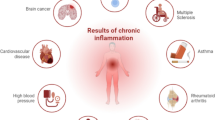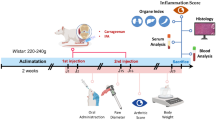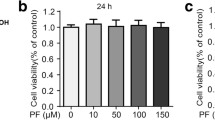Abstract
The pathogenesis of ulcerative colitis (UC) remains unclear, and it is believed that an imbalance of regulatory T (Treg) cells and T helper 17 (Th17) cells is related to the occurrence of UC. Curcumin has been confirmed to exert anti-inflammatory effects in bronchial asthma and osteoarthritis by regulating the balance of Treg/Th17 cells. This study aimed to explore the therapeutic potential of curcumin in dextran sulfate sodium (DSS)–induced UC rats by regulating the balance of Treg/Th17 cells. Disease activity index (DAI) scores were calculated. Changes in colon inflammation were observed using hematoxylin and eosin staining. Treg and Th17 cells in the spleen were detected by flow cytometry, and the levels of interleukin (IL)-10 and IL-17A were determined using enzyme-linked immunosorbent assay. In DSS-induced colitis, curcumin significantly ameliorated colitis symptoms by reducing the DAI and increasing colon length. Additionally, curcumin significantly increased the expression of Treg cells and decreased the expression of Th17 cells and the extent of histopathological damage. Furthermore, curcumin increased the expression of IL-10 and decreased the expression of IL-17A. Curcumin attenuates DSS-induced UC injury by regulating Treg/Th17 balance and related cytokine secretion. Thus, curcumin may be a promising therapeutic drug for treating UC.




Similar content being viewed by others
Availability of Data and Materials
All data generated and analyzed during this study are included in this published article.
References
Jeong, D.Y., S. Kim, M.J. Son, C.Y. Son, J.Y. Kim, A. Kronbichler, K.H. Lee, and J.I. Shin. 2019. Induction and maintenance treatment of inflammatory bowel disease: a comprehensive review. Autoimmun Rev 18: 439–454. https://doi.org/10.1016/j.autrev.2019.03.002.
Imdad, A., M.R. Nicholson, E.E. Tanner-Smith, J.P. Zackular, O.G. Gomez-Duarte, D.B. Beaulieu, and S. Acra. 2018. Fecal transplantation for treatment of inflammatory bowel disease. Cochrane DB Syst Rev 11: CD012774. https://doi.org/10.1002/14651858.CD012774.pub2.
van der Sloot K.W.J., M. Amini, V. Peters, G. Dijkstra, and B.Z. Alizadeh. 2017. Inflammatory bowel diseases: review of known environmental protective and risk factors involved. Inflamm Bowel Dis 23:1499–1509. https://doi.org/10.1097/MIB.0000.000000001217.
Esatbeyoglu, T., P. Huebbe, I.M.A. Ernst, D. Chin, A.E. Wagner, and G. Rimbach. 2012. Curcumin-from molecule to biological function. Angew Chem Int Edit 51: 5308–5332. https://doi.org/10.1002/anie.201107724.
Hatcher, H., R. Planalp, J. Cho, F.M. Torti, and S.V. Torti. 2008. Curcumin: from ancient medicine to current clinical trials. Cell Mol Life Sci 65: 1631–1652. https://doi.org/10.1007/s00018-008-7452-4.
Kunnumakkara, A.B., P. Anand, and B.B. Aggarwal. 2008. Curcumin inhibits proliferation, invasion, angiogenesis and metastasis of different cancers through interaction with multiple cell signaling proteins. Cancer Lett 269: 199–225. https://doi.org/10.1016/j.canlet.2008.03.009.
Ma, C., Z. Ma, Q. Fu, and S. Ma. 2013. Curcumin attenuates allergic airway inflammation by regulation of CD4+CD25+ regulatory T cells (Tregs)/Th17 balance in ovalbumin-sensitized mice. Fitoterapia 87: 57–64. https://doi.org/10.1016/j.fitote.2013.02.014.
Atabaki, M., Z. Shariati-Sarabi, J. Tavakkol-Afshari, and M. Mohammadi. 2020. Significant immunomodulatory properties of curcumin in patients with osteoarthritis; a successful clinical trial in Iran. Int Immunopharmacol 85: 106607. https://doi.org/10.1016/j.intimp. 2020. 106607.
Ung, V.Y., R.R. Foshaug, S.M. MacFarlane, T.A. Churchill, J.S.G. Doyle, B.C. Sydora, and R.N. Fedorak. 2010. Oral administration of curcumin emulsified in carboxymethyl cellulose has a potent anti-inflammatory effect in the IL-10 gene-deficient mouse model of IBD. Digest Dis Sci 55: 1272–1277. https://doi.org/10.1007/s10620-009-0843-z.
Zhao H.M., R. Xu, X.Y. Huang, S.M. Cheng, M.F. Huang, H.Y. Yue, X. Wang, Y. Zou, A.P. Lu, and D.Y. Liu. 2016. Curcumin improves regulatory T cells in gut-associated lymphoid tissue of colitis mice. World J Gasetroenterol 22: 5374–5383. https://doi.org/10.3748/wjg.v22.i23.5374.
Zhao G.J., Q.L. Zhang, L.M. Tang, Z.S. Wu, D.W. Wang, J.Y. Zheng, and Q.M. Qiu. 2012. Curcumin inhibits suppressive capacity of naturally occurring CD4+CD25+ regulatory T cells in mice in vitro. Int Immunopharmacol 14: 99–106. https://doi.org/10.1016/j.intimp.2012.06.016.
Guo, J., L.Y. Wang, J. Wu, L.F. Xu, and M. Sun. 2020. The JAK2 Inhibitor AG490 regulates the Treg/Th17 balance and alleviates DSS-induced intestinal damage in IBD rats. Clin Exp Pharmacol Physiol 47: 1374–1381. https://doi.org/10.1111/1440-1681.13311.
Zhang, L., Y. Zhang, W. Zhong, C. Di, X. Lin, and Z. Xia. 2014. Heme oxygenase-1 ameliorates dextran sulfate sodium induced acute murine colitis by regulating Th17/Treg cell balance. J Biol Chem 289: 26847–26858. https://doi.org/10.1074/jbc.M114.590554.
Gibson, D.J., E.J. Ryan, and G.A. Doherty. 2013. Keeping the bowel regular: the emerging role of Treg as a therapeutic target in inflammatory bowel disease. Inflammatory Bowel Diseases 19: 2716–2724. https://doi.org/10.1097/MIB.0b013e31829ed7df.
Yang, J.Y., X. Zhong, H.W. Yum, H.J. Lee, J.K. Kundu, H.K. Na, and Y.J. Surh. 2013. Curcumin inhibits STAT3 signaling in the colon of dextran sulfate sodium-treated mice. J Cancer Prev 18:186–191. https://doi.org/10.15430/jcp.2013.18.2.186.
Kagami, S., T. Owada, H. Kanari, Y. Saito, A. Suto, K. Ikeda, K. Hirose, N. Zatanabe, I. Iwamoto, and H. Nakajima. 2009. Protein geranylgeranylation regulates the balance between Th17 cells and Foxp3+ regulatory T cells. Int Immunol 21: 679–689. https://doi.org/10.1093/intimm/dxp037.
Murakami, A., I. Furukawa, S. Miyamoto, T. Tanaka, and H. Ohigashi. 2013. Curcumin combined with turmerones, essential oil components of turmeric, abolishes inflammation-associated mouse colon carcinogenesis. Biofactors 39: 221–232. https://doi.org/10.1002/biof.1054.
Gong, Z., Zhao S, J. Zhou, J. Yan, L. Wang, X. Du, H. Li, Y, Chen, W. Cai, and J. Wu. 2018. Curcumin alleviates DSS-induced colitis via inhibiting NLRP3 inflammsome activation and IL-1beta production. Mol Immunol 104: 11–19. https://doi.org/10.1016/j.molimm.2018.09.004.
Awasthi, A., G. Murugaiyan, and V.K. Kuchroo. 2008. Interplay between effector Th17 and regulatory T cells. J Clin Immuno 28: 660–670. https://doi.org/10.1007/s10875-008-9239-7.
Li, L., and V.A. Boussiotis. 2013. The role of IL-17-producing Foxp3+ CD4+ T cells in inflammatory bowel disease and colon cancer. Clin Immunol 148: 246–253. https://doi.org/10.1016/j.clim.2013.05.003.
Wei, C., J.Y. Wang, F. Xiong, B.H. Wu, M.H. Luo, Z.C. Yu, T.T. Liu, D.F. Li, Q. Tang, and Y.X. Li, et al. 2021. Curcumin ameliorates DSS-induced colitis in mice by regulating the Treg/Th17 signaling pathway. Mol Med Rep 23: 34. https://doi.org/10.3892/mmr.2020.11672.
Zhao G.J., Z.Q. Lu, L.M. Tang, Z.S. Wu, D.W. Wang, J.Y. Zheng, and Q.M. Qiu. 2012. Curcumin inhibits suppressive capacity of naturally occurring CD4+CD25+ regulatory T cells in mice in vitro. Int Immunopharmacol 14:99–106. https://doi.org/10.1016/j.intimp.2012.06.016.
Zou, J.Y., C.H. Su, H.H. Luo, Y.Y. Lei, B. Zeng, H.S. Zhu, and Z.G. Chen. 2018. Curcumin converts Foxp3+ regulatory T cells to T helper 1 cells in patients with lung cancer. J Cell Biochem 119: 1420–1428. https://doi.org/10.1002/jcb.26302.
Yang X.O., S.H. Chang, H. Park, R. Nurieva, B. Shah, L. Acero, Y.H. Wang, K.S. Schluns, R.R. Broaddus, and Z. Zhu, et al. 2008. Regulation of inflammatory responses by IL-17F. J Exp Med 205: 1063–1075. https://doi.org/10.1084/jem.20071978.
Xie, L., X.K. Li, N. Funeshima-Fuji, H. Kimura, Y. Matsumoto, Y. Isaka, and S. Takahara. 2009. Amelioration of experimental autoimmune encephalomyelitis by curcumin treatment through inhibition of IL-17 production. Int Immunopharmacol 9: 575–581. https://doi.org/10.1016/j.intimp.2009.01.025.
Wang,S., H. Li,M. Zhang,L.T. Yue, C.C. Wang, P. Zhang, Y. Liu, and R.S. Duan. 2016. Curcumin ameliorates experimental autoimmune myasthenia gravis by diverse immune cells. Neurosci Lett 626: 25–34. https://doi.org/10.1016/j.neulet.2016.05.020.
Midura-Kiela, M.T., V.M. Radhakshnan,C.B. Larmonier,D. Laubitz, F.K. Ghishan, and P.R. Kiela. 2012. Curcumin inhibits interferon-γ signaling in colonic epithelial cells. Am J Physiol-Gastr L 302: G85-G96. https://doi.org/10.1152/ajpgi.00275.2011.
Larmonier, C.B., J.K. Uno, K.M. Lee, T. Karrasch, D. Laubitz, R. Thurston, M.T. Midura-Kiela, F.K. Ghishan, R.B. Sartor, and C. Jobin, et al. 2008. Limited effects of dietary curcumin on Th-1 driven colitis in IL-10 deficient mice suggest an IL-10 dependent mechanism of protection. Am J Physiol-Gastr L 295: G1079-G1091. https://doi.org/10.1152/ajpgi.90365.2008.
Epstein, J., G. Docena, T.T. MacDonald, and I.R. Sanderson. 2010. Curcumin suppresses p38 mitogen activated protein kinase activation, reduces IL-1β and matrix metalloproteinase 3 and enhances IL-10 in the mucosa of children and adults with inflammatory bowel disease. British J Nutrition 103: 824–832. https://doi.org/10.1017/S0007114509992510.
Sadeghi N., A. Mansoori, A. Shayesteh, and S.J. Hashemi. 2020. The effect of curcumin supplementation on clinical outcomes and inflammatory markers in patients with ulcerative colitis. Phytother Res 34: 1123–1133. https://doi.org/10.1002/ptr.6581.
Masoodi M., M.A. Mahdiabadi, M. Mokhtare, S. Agah, A.H.F. Kashani, A.M., Rezadoost, M. Sabzikarian, A. Talebi, and A. Sahebkar. 2018. The efficacy of curcuminoids in improvement of ulcerative colitis symptoms and patients’ self-reported well-being: a randomized double-blind controlled trial. J Cell Biochem 119: 9552–9559. https://doi.org/10.1002/jcb.27273.
Bommelaer G., D. Laharie, S. Nancey, X. Hebuterne, X. Roblin, M. Nachury, L. Peyrin-Biroulet, M. Fumery, D. Richard, and B. Pereira, et al. 2020. Oral curcumin no more effective than placebo in preventing recurrence of Crohn’s disease after surgery in a randomized controlled trial. Clin Gastroenterol Hepatol 18: 1553–1560.e1. https://doi.org/10.1016/j.cgh.2019.08.041.
Acknowledgements
We thank Li-yun Wang for guiding the writing of this article.
Funding
This work was supported by grants from Ling-fen Xu (Natural Science Foundation of Liaoning Province, China, 2019-MS-372, Science and Technology Plan of Liaoning Province, 2021JH2/10300094), and 345 Talent Project from Jing Guo.
Author information
Authors and Affiliations
Contributions
Jing Guo performed the experiment and wrote the paper, Yan-yan Zhang performed the experiments and collected the data, Mei Sun performed the statistics, and Ling-fen Xu provided overall guidance.
Corresponding author
Ethics declarations
Ethics Approval
The study was approved by the Ethics Committee of the Affiliated Shengjing Hospital of China Medical University (approval no. 2015PS244K, Shenyang, China).
Consent to Participate
Not applicable.
Consent for Publication
Not applicable.
Competing Interests
The authors declare no competing interests.
Additional information
Publisher's Note
Springer Nature remains neutral with regard to jurisdictional claims in published maps and institutional affiliations.
Supplementary Information
Below is the link to the electronic supplementary material.
Rights and permissions
About this article
Cite this article
Guo, J., Zhang, Yy., Sun, M. et al. Therapeutic Potential of Curcumin in a Rat Model of Dextran Sulfate Sodium–Induced Ulcerative Colitis by Regulating the Balance of Treg/Th17 Cells. Inflammation 45, 2163–2171 (2022). https://doi.org/10.1007/s10753-022-01678-1
Received:
Revised:
Accepted:
Published:
Issue Date:
DOI: https://doi.org/10.1007/s10753-022-01678-1




